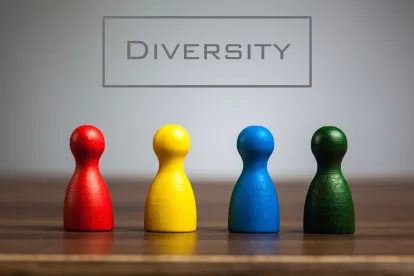In a November 2019 blog post, Intel’s Executive Vice President and General Counsel Steven R. Rodgers announced Intel’s new diversity requirements.[1] “Beginning Jan. 1, 2021, Intel will not retain or use outside law firms in the U.S. that are average or below average on diversity.”
Intel’s new “above-average” rule requires that firms doing work for Intel show (1) at least 21% of the firm’s U.S. equity partners are women, and (2) at least 10% of the firm’s U.S. equity partners are underrepresented minorities, defined by Intel as equity partners whose race is other than full white/Caucasian, and partners who have self-identified as LBGTQ+, disabled or as veterans.
In the announcement, Mr. Rodgers noted that for large U.S. law firms, “only about 20% of full equity partners are women, and only about 8 or 9% are underrepresented minorities,” and at the current rate of improvement, such firms “will not reach 50% women and 33% racial and ethnic minorities in their equity partner ranks – which would mirror the composition of recent law school graduating classes – for at least another 50 years.”
“That sluggish progress is not enough for our profession, … we need a Moore’s Law of diversity in the legal profession and, even more, we need the fearlessness that goes with it.”
Mr. Rodgers recognized that this above-average rule may prevent some firms who have worked with Intel in the past from doing work with Intel in the future until the firm meets the diversity criteria.
Earlier this month, Women Owned Law, a national nonprofit networking group for women-owned law firms and legal service firms, and the National LGBT Chamber of Commerce co-signed a letter applauding and asking to help implement Intel’s new rule.[2]
The law.com article reported that, “[a]n Intel spokesperson told Corporate Counsel in an email Thursday that [Intel] is ‘thrilled’ with the responses it has received since announcing the rule. The company is also ‘creating more opportunities for diverse law students to learn about tech.’” It further stated, “[t]hrough these programs, Intel aims to improve access to in-house careers at tech companies by expanding opportunities to connect and learn, while removing barriers for underrepresented talent in the legal industry.”
It’s important to note that Intel is also walking their talk. In December, Intel released its 2019 Diversity and Inclusion Report.[3]
“If we want to shape the future of technology, our workforce must be representative of that future. . . . We feel a sense of responsibility to continue to lead the industry in this space by raising the transparency bar for ourselves and, as a result, raising it for others.”
In January,[4] Intel hired Archana Deskus as its new Senior VP and Chief Information Officer. “It’s a good opportunity to increase diversity in upper management and work to better understand the technology they [artificial intelligence and supercomputing products] bring to market,” Mr. Krewell said.
While over 170 general counsels signed an “Open Letter”[5] in January 2019 stating that they will not do business with firms unless these firms hire, retain and promote diverse associates, the letter does not provide measurable goals or stated consequences for a firm’s failure to be diverse. Intel’s new policy is a major push in holding firms accountable. As more and more corporations require diversity within their own ranks, it is foreseeable that these corporations will hold outside firms to standards similar to those of Intel.
[1] See https://newsroom.intel.com/editorials/intel-rule-action-improve-diversity-legal-profession/#gs.vcwtny; see also https://www.law360.com/articles/1222606/intel-unveils-diversity-demands-for-law-firms-it-hires
[2] See https://www.worldipreview.com/news/women-and-minority-reps-welcome-intel-s-new-diversity-rule-19131; see also https://www.law.com/corpcounsel/2020/01/16/diversity-groups-want-to-help-intel-implement-outside-counsel-rule/
[3] https://www.hpcwire.com/off-the-wire/intel-releases-2019-diversity-and-inclusion-report/
[4] https://newsroom.intel.com/news-releases/intel-appoints-archana-deskus-senior-vice-president-chief-information-officer/
[5] https://drive.google.com/file/d/1EfzrIJ_nxOpaZTSAdVu_ercVGCbLEZpU/view





 />i
/>i

